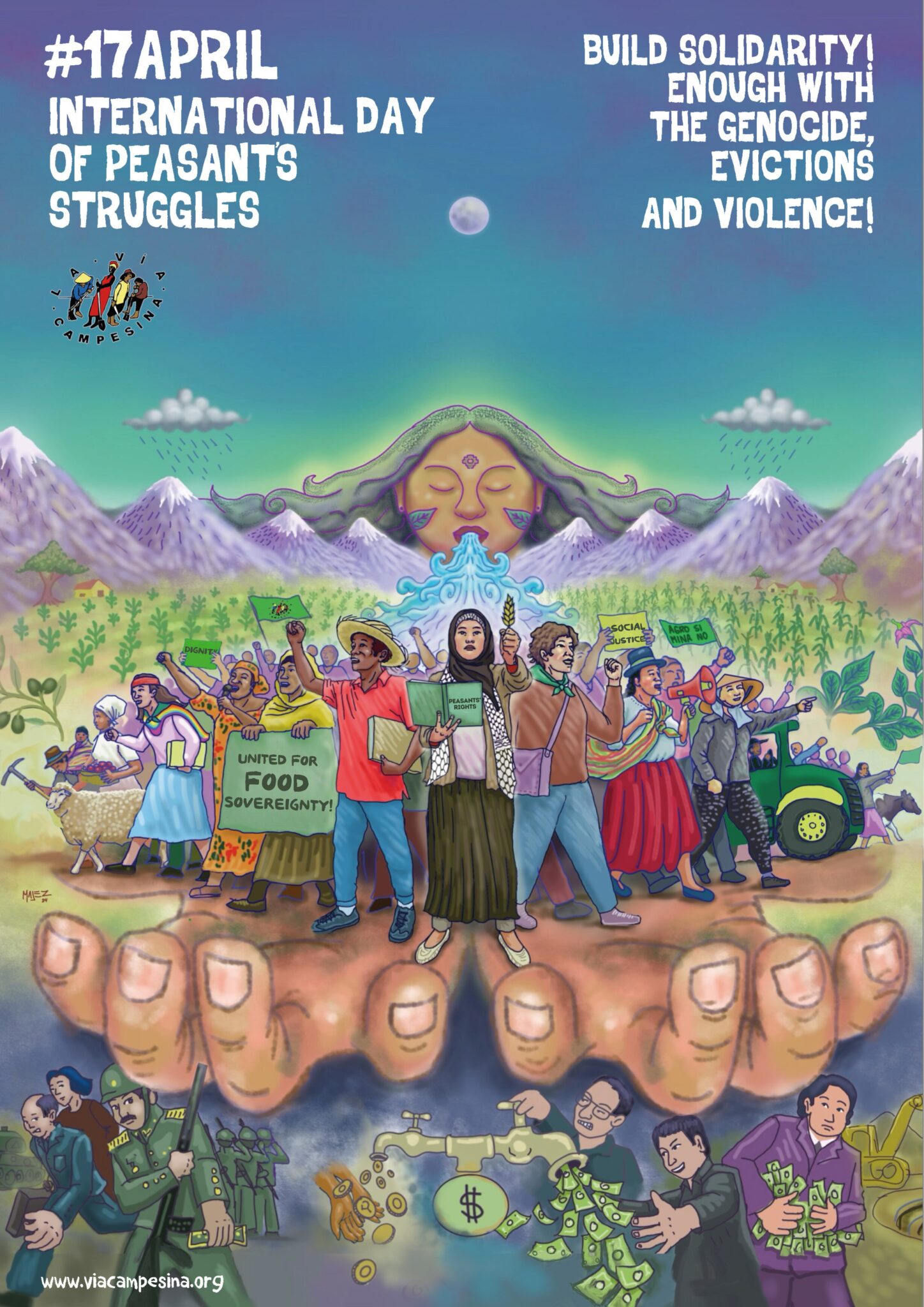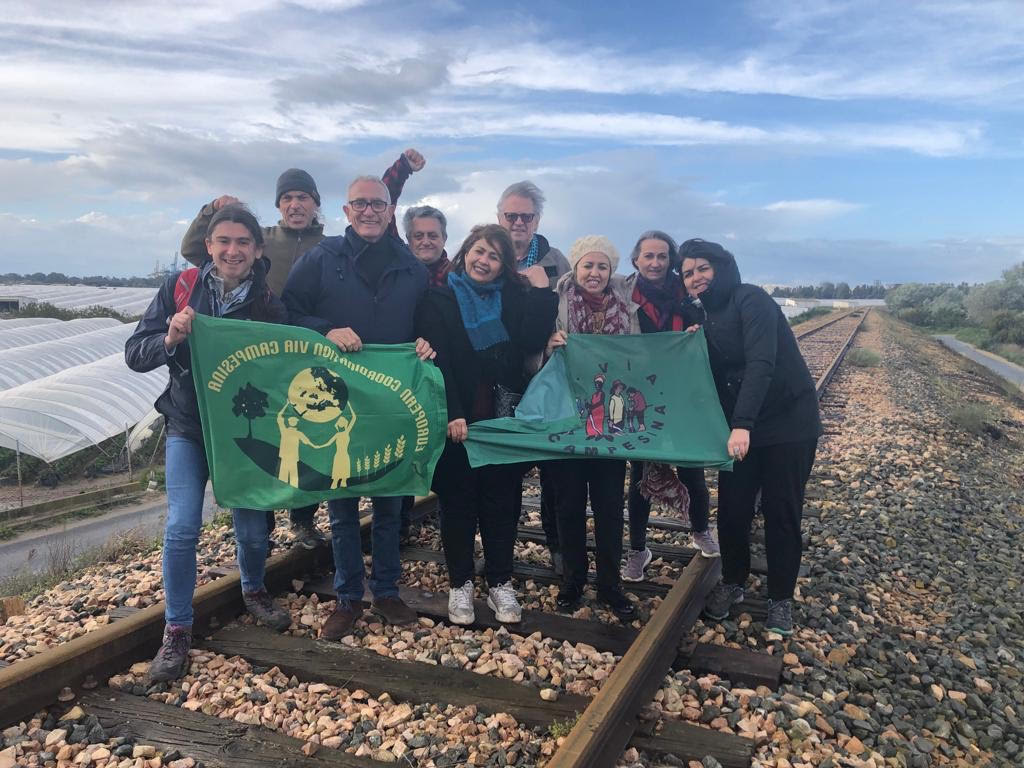Today, April 17th, marks the International Day of Peasant Struggles, a day that brings us together as a global movement to commemorate the 1996 Eldorado do Carajás massacre, and all those who have lost their lives in the struggle for peasant rights.
But while it is a day to remember and grieve, it is also a day to honour the resistance of peasants worldwide whose struggle for justice, self determination and food sovereignty still persists. On this day, we celebrate the importance of global solidarity, of standing with farmers, peasants and landworkers in other parts of the world, recognising that our struggles against systems of oppression are deeply and historically entwined, and that our movements, in all their diversity, are united by a common vision.

This year to celebrate International Day of Peasant Struggles we want to inform our members about the LWA’s role within the wider global networks of La Via Campesina, and how members can get more involved in international organising!
How is LWA connected to the global struggle for food sovereignty and peasant rights?
Since our inception in 2012, LWA has been a member of the global peasant movement La Via Campesina which represents over 200 million peasant and small-scale farmers, landworkers, Indigenous people and fisherfolks across 80 countries across the globe.
La Via Campesina organises in 10 regions: Central America, North America, South America, Caribbean, Southern and Eastern Africa, Western and Central Africa, South Asia, South East and East Asia, ‘Emerging Regions’ and Europe. You can find out more about La Via Campesina on their website.
What is ECVC?
European Coordination Via Campesina (ECVC) represents the European region of La Via Campesina. ECVC is a confederation of farming unions and organisations of peasant farmers, small and medium-scale farmers, and agricultural workers across Europe, and is currently composed of 31 national and regional peasant farmer organisations from over 21 countries. As a UK organisation the LWA therefore organise regionally with ECVC. You can find the full list of ECVC member organisations yma.
The main decision making body for ECVC is the ECVC General Assembly, in which each member organisation has one vote. On the 24th of April ECVC will host its virtual 2024 General Assembly, and the Landworkers’ Alliance will be sending two delegates to represent our members at the European level, and to input on important strategic and budget decisions.
ECVC member organisations play a crucial role in the governance structure, not only by attending General Assemblies and appointing the ECVC Coordinating Committee, but also by engaging with ECVC Working Groups and Articulations.
What are ECVC Working Groups and Articulations?
ECVC structures its different areas of work through Working Groups and Articulations. There are currently 9 active Working Groups (European Policies, Global Governance, Production, Peasant Agroecology, Rural Workers and Migration, Trade, Right to Land, Seeds and Genetically Modified Organisms (GMOs) and Peasants’ Rights) and 3 Articulations (Youth, Women and Gender and Sexual Diversities). You can read more about the work of each Working Group and Articulation yma.
Over the years LWA members have engaged in various ECVC Working Groups; attending international conferences, contributing to research and report-writing, and taking part in educational exchange visits.
LWA currently has several Members and staff members who sit within various ECVC Working Groups, here’s what they have to say about their experiences:
Alongside her work leading the LWA’s Migrant Solidarity campaign, Catherine McAndrew is also an active member of ECVC’s Migrant and Rural Workers Working Group.
“ECVC working groups really help us get the most out of the LWA’s international connections. Participation in the ECVC Migrants and Rural Workers Working Group has helped me build close relationships with agricultural workers unions affiliated to ECVC and provide them with real, concrete support when they take action in support of their members working in the UK’s agroindustrial supply chains.
It’s also given me the opportunity to take part in La Via Campesina delegations and allowed me to witness the conditions that farmworkers in other countries work in with my own eyes. I highly recommend getting involved with them!”


Tara Wight is the LWA Scotland Policy and Campaigns Coordinator, and has recently joined the ECVC Land Rights Working Group.
“I was lucky enough to have the opportunity to represent the ECVC working group on land at an international conference on land grabbing in Bogota, Colombia. This event brought together researchers, policy makers and social movement activists from around the world to share knowledge and address issues of land justice.
I learned so much about radical and inspiring movements resisting land grabs in the global south, discussed different models of land redistribution which have been implemented around the world, and had the opportunity to visit a peasant community who are developing an agroecological farming system on land that was confiscated from a drug lord and redistributed to the people. So much of this learning will be helpful for my campaigning work in Scotland, and I hope will inspire us to take bold action for land justice here in solidarity with international movements”
Edwin Brooks is a market gardener and an LWA Member Organiser. In November 2023 Ed travelled to Colombia to represent LWA at the La Via Campesina 8th International Conference where he had the opportunity to meet and build strong alliances with other ECVC delegates.
“It’s really great to be connected to other small scale farmers in Europe, to share ideas about politics and build solidarity. I think post Brexit it’s more important than ever that the LWA has a strong voice in ECVC as although we are no longer part of the EU law-making framework our experiences and perspectives are valued by our European comrades, and we face many of the same opponents and challenges to food sovereignty.
The democratic systems of LA Via Campesina are structured so that regions cooperate to bring the voices of member organisations to the wider movement so joining ECVC working groups is a great way to feel connected and as an exchange of learning and solidarity with the 200 million global members of La Via Campesina. Meetings are held on zoom, but engagement also provides opportunities for travel and to meet European and global LVC members in person at inspiring international events.”
Don’t forget to check out Episode 4 of our recent Of Sweat and Soil podcast series ‘Solidarity’, which hears more from Edwin and Jo Kamal on their experience and take-aways from the La Via Campesina Conference in Bogotá.
Are you an LWA Member or Supporter and want to getting more involved in organising on an international level?
Join an ECVC Working Group
Members of ECVC Working Groups are expected to provide opinion, input, guidance and leadership about how ECVC should react or answer to certain issues, contribute to publications and surveys and sometimes represent ECVC in specific meetings with policy makers or at conferences. Working Groups meet virtually every 6-8 weeks and in-person once a year, and communication around this is typically via virtual calls and emails.
If you are interested in joining an ECVC Working Group please email yali.bantonheath@landworkersalliance.org.uk for more information.
Join the LWA Internationalism Working Group
The purpose of the LWA Internationalism Working Group is to share urgent calls to action, coordinate the international solidarity efforts of LWA Members, Supporters and Staff and think strategically about how the LWA can respond to, and support, the work of our international allies. The Internationalism Working Group has had a recent revival, and is now aiming to meet regularly once every two months.
If you are interested in joining the LWA Internationalism Working Group, please email yali.bantonheath@landworkersalliance.org.uk.

